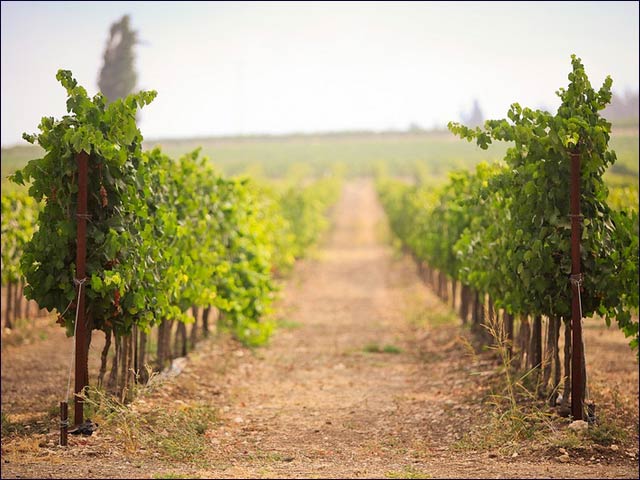By Sarah Carnvek
Raising a toast with award-winning Israeli wine is easy. The hard part is which one to choose.
“Israeli wine has been transformed in the last 20 years by producers who have imported wine expertise to go with their existing technological and agricultural prowess,” writes British expert Hugh Johnson in his 2012 Pocket Wine Book.
The latest fashion in Israeli wine is boutique wineries. From north to south, east to west, small, family-owned or solo operations are popping up all over the Israeli landscape.
"Until 1995, there were just seven boutique wineries in Israel. By 2000, we had 100. Today, there are between 280 and 300," says Oded Shoham of Israel Wine Experience, which provides tours, tastings and lectures.
The country's boutique wineries are all about the people behind the product.
There are those like Yair Margalit of Margalit Winery and Yossi Yittach of Katlav, who trained in different careers but ultimately followed a dream of making wine. There are others like Eli Ben-Zaken of Domaine du Castel, whose hobby of crushing grapes into liquid goodness took over his life.
"You see people who have fulfilled their dream and you taste it in their wine," says Shoham, who has been on the forefront of the Israeli wine industry for more than 25 years. "It's not like buying a bottle off a shelf; there's a person and a temperament that stands behind the bottle. It makes it a more interesting story."
Wine in the Holy Land
Winemaking in Israel can be traced back thousands of years. The ancient land of Canaan was one of the earliest countries to cultivate grapes for wine. It's no coincidence that grape clusters and vines were frequent motifs on ancient pottery, mosaics and coins.

A wide variety of wine grapes grow well in Israel
Photo courtesy of Clos de GatThe first modern winery in Israel was the award-winning Carmel Winery, founded by Baron Edmond James de Rothschild in Zichron Yaakov in 1882. Fast forward to the 1980s and the industry started to blend its pioneer agriculture skills with state-of-the-art technology.
Wine has been made in the Holy Land for millennia, but Israel's wineries have come into the modern age since the 1980s, when producers began borrowing vinification techniques from France and the US. The region's wines are getting better all the time, and some are superb," writes leading US wine critic Robert Parker.
And while Carmel makes outstanding wine, the smaller, family businesses have proven they can produce a perfect bottle, too.
Parker, who is the barometer of the wine world, recently awarded an amazing 93 points to four Israeli wineries – three of them boutiques. The winners for the 2012 ranking of Parker's Wine Advocate were Margalit, Domaine Du Castel, Clos de Gat and Yatir (a subsidiary of Carmel).
Speaking about Domaine Du Castel, Parker describes the Judean Hills winery as one of the "most successful wineries over the five years . . . Castel has had no less than 13 wines being awarded 90 points or more."
"Israeli wine certainly has a good name," says Shoham. "In terms of reviewers, we're sitting in a very good place."
White wine's comeback
Israel may be a small country, but winemakers have combined innovative technologies with agricultural expertise to make the fertile land yield a whole gamut of varieties.
There's Cabernet Sauvignon, Merlot, Cabernet Franc, Petit Verdot, Syrah, Grenache, Mourvèdre, Carignan, Petite Syrah, Roussanne, Grenache Blanc, Viognier and Touriga Nacional, among many others on vines around the country.
"We grow wine, not grapes,” Carmel Wine development director Adam Montefiore has said. “Wine is an agricultural product and 90 percent of the result depends on the work in the vineyard because you can’t get good wine from bad grapes.”
There are five wine-growing regions in Israel: the Galilee and Golan Heights; Judean Hills; Negev Desert region; the Sharon Plain; and Shimshon.
Sales of Israeli wines stand at $315 million per year, according to Wines Israel, and the country exports some $30 million worth of wine annually. The main importers of Israeli wines are the United States, France, the United Kingdom, Canada, Poland, Germany and Holland.
Moreover, thousands of people from around the world take part in the IsraWineExpo – an international professional exhibition in Tel Aviv that has become a regular meeting place for winemakers, importers, investors, buyers, restaurateurs, food and beverage managers, barmen and sommeliers, decision-makers, journalists and leading wine purchasers.
Shoham says the next big thing coming from the Israeli market will be white wine.
"About five years ago, the white wines went out of style," he says. "Today you cannot find good enough white wines. Start looking forward to great white wines coming out of here within the next five years."